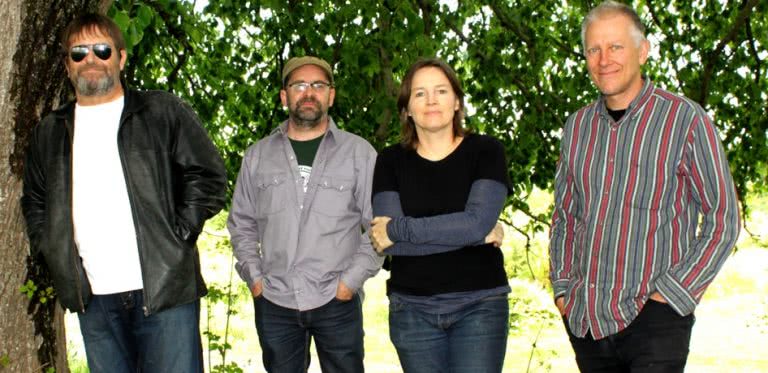Reviewed onSunday January 29
“This is serious!” smirked the chief songwriter for The Bats, Robert Scott, early into the band’s Sydney Festival set. It was a telling moment: a declaration of sincerity delivered in the most insincere way possible has long been the modus operandi for these Flying Nun legends, and a rubbery, artfully odd sense of the heartfelt has remained the key to their sound for the four decades they’ve been gigging about the place.
That longevity might go a long way to explaining how tight they sounded – Paul Kean’s wire-taut basslines have not aged a day, proving the driving force of the proceedings, while Kaye Woodward’s vocals remain uncracked – but it doesn’t explain how strangely of-the-moment their songs still are. Despite first being released decades ago, a tune like ‘Treason’ appears astoundingly fresh, and its boppy, melancholia-drenched chorus had the truly diverse Spiegeltent crowd bobbing and nodding along.
The majority of the 90-minute showing was dominated by the group’s new record, The Deep Set, an eminently loveable slice of Dunedin pop and one of the most Bats-esque albums they’ve yet dropped. Bolstered by a small string section, the band meandered its way through the work in its distinctly unhurried way, stopping to chat to the receptive audience every now and then and smiling politely at called-out requests.
Yet the show wasn’t all fun and games, no matter how light and airy the songs unveiled proved to be. Indeed, there was an air of the epilogue about the proceedings, and despite the fact The Deep Set arrived only last week, one couldn’t shake the strange sense of an ending that seemed to haunt the band. All the quiet tragedy of a song like ‘Antlers’ felt hardened, and the bitter in bittersweet soon began to take centre stage.
That sense of finality was given a voice when Scott warned that it might well be the last time The Bats would be playing some of their older songs, particularly the cuts from their celebrated debut Daddy’s Highway. The crowd moaned, but Scott refused to waver. “It’s bad times we live in,” he said jokingly. “Sorry, nothing we can do.”
But he was right. These are bad times. And perhaps that’s why a song like ‘Block Of Wood’ feels the way it does now – rigid and powerful, but somewhat alien. The Bats’ catalogue has not dated, but it has changed, flinching away from cynicism and metamorphosing into something oddly foreign. Three decades ago, a pop song could feel good; now such optimism seems to reflect a world that no longer exists. The Bats might not have changed. But the world has.

































